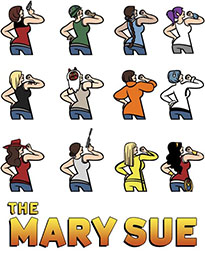Hello, Mary Sue
by Mel Gilden
If you can't arrange to write bestsellers, writing media tie-ins is not a bad way to make a living as a writer. You'll be hired to write a novel based on a movie or a few TV episodes, or maybe you'll end up writing new stories based on characters and situations created by somebody else. If you're a fan of the source material, the work can even be fun. One year I made a lot of money writing novelizations of Beverly Hills, 90210 episodes; and around that same time I wrote a couple of original Star Trek novels.
Of course, when writing media tie-ins a writer may fall into the same traps as he may fall into when writing anything. I have a good friend who is a very good and popular writer who sold a Star Trek novel from a four page outline. Selling it meant that she now had to write it. She dove right in and eventually came to the point in her outline where "four guys take over the Enterprise." She had no idea how this was going to happen. She figured it out at last, but not before she went through what must have been a horrendous few days of sweating blood.
Fans of a particular show, say Star Trek in any of it's incarnations, will often write Star Trek fan fiction. This fiction runs from pretty good to absolutely dreadful. But generally, the writer of fan fiction makes two mistakes, often both at the same time.
First, the fan writer wants desperately to write a real Star Trek novel that will be published and admired by millions. Unless the fan is a professional writer, it is unlikely that this will happen. The editor of the Star Trek novel series has neither the time, the energy, or the interest in teaching an amateur how to write a novel. Unless a writer has proven himself by writing and publishing something original, the chances of being hired for a media tie-in gig are slim.

Second, in many cases the story the fan wants to write will be what we in the trade call a "Mary Sue" story. In this sort of story the guest character — usually a stand-in for the writer himself — runs around doing all the heroic stuff that the regular series characters usually do, stopping only occasionally to have a romantic fling with one of the regular characters. These sorts of stories are rejected out of hand by the professional editor. The only person interested in reading a "Mary Sue" story is the person who wrote it and maybe a circle of close friends. Everybody else, the average Star Trek fan, wants to read about Kirk and Spock, not about "Mary Sue."
I have offered these facts — before you look for a tie-in job you must demonstrate that you can write a professional novel, and leave "Mary Sue" out of it — on many panels at many conventions. Often the response from the audience is anger. I am accused of being afraid of competition from all the blossoming Heinleins and Bradburys in the audience, just hungering for a chance, hungering for a clue about the secret handshake that will admit them into the biz. The room gets pretty boisterous sometimes.
Of course, all that is ridiculous. I wish I had that kind of power! Many professional writers were once fans, proving that if a fan keeps working and if he is good enough, he will get into the business no matter how much I may want to keep him out. If I wanted to keep him out. Which I don't.